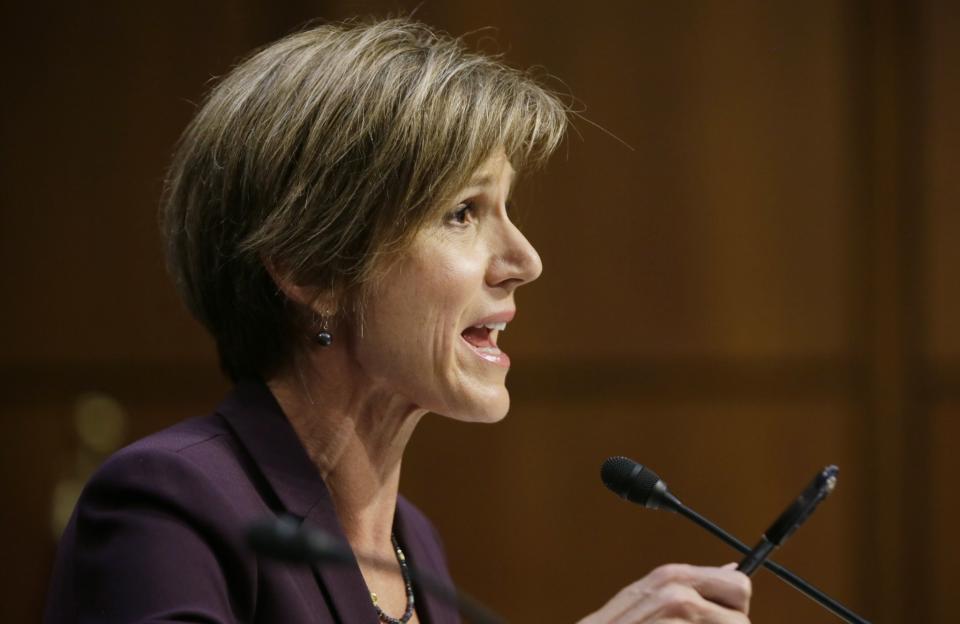Trump advisers had ‘sensitive’ contacts with Russian agents for months, Clapper testifies
British and other European intelligence agencies provided “quite sensitive” reports about contacts between advisers to the then candidate Donald Trump and Russian agents starting in late 2015, James Clapper, former director of national intelligence testified today.
Clapper’s testimony before a Senate judiciary subcommittee represented the first public confirmation of such reports, providing important new context about ongoing investigations into possible collusion between the Trump campaign and the Kremlin.
It came during a day of dramatic testimony in which former Acting Attorney General Sally Yates revealed fresh details about warnings she gave to White House counsel Don McGahn about Trump’s short-lived national security advisor Michael Flynn. Yates said she informed the White House that Flynn had given false accounts about his conversations with Russian ambassador Sergey Kislyak.
While she refused to describe specifically the contacts with Kislyak — noting the matter was still classified — Yates emphasized she had two separate meetings with McGahn at the White House about the issue of Flynn’s “conduct” — on Jan. 26 and again the next day — as well as a follow-up phone call. During her talks with McGahn, she said, she told him this was a “matter of some urgency” and that she was concerned that Vice President Mike Pence — who had publicly defended Flynn — was “unknowingly making false statements.”

But at the second meeting, McGahn seemed to raise an objection, according to Yates’ account.
“One of the questions that Mr. McGahn asked me when I went back over the second day was essentially, Why does it matter to the DOJ [Department of Justice] if one White House official lies to another White House official?”
Yates said she explained that Flynn had “lied to the vice president and others, the American public had been misled and then importantly, that every time this lie was repeated and the misrepresentations were getting more and more specific, as they were coming out.
“Every time that happened, it increased the compromise, and to state the obvious, you don’t want your national security adviser compromised with the Russians.”
Yates refused repeatedly to discuss the underlying “conduct” at issue. But multiple current and former government officials have confirmed that it involved conversations Flynn had had with Kislyak on Dec. 29, including assurances he is believed to have given the ambassador that sanctions imposed by President Obama that day on Russia over its hacking of the 2016 campaign would be revisited when Donald Trump took office in January.

Flynn was finally fired as national security adviser on Feb. 13, a full 18 days after Yates first warned McGahn. This prompted Democrats, led by Sen. Sheldon Whitehouse, to note that while the country was focused on an 18-minute gap in Oval Office tapes during Watergate, there was an equally mystifying “18-day gap” before Flynn was fired — a period during which he continued to serve as national security adviser and even participated in an hour-long phone call with Russian President Vladimir Putin.
Even before the hearings began, Trump was focused on another issue: How the news about Flynn’s contacts with Kislyak, and Yates’ concerns, made its way into the media. “Ask Sally Yates, under oath, if she knows how classified information got into the newspapers soon after she explained it to W.H. Council,” he wrote in one tweet before the hearing began, later correcting the spelling of the position to “Counsel.” Yates was asked by Sen. Charles Grassley, R-Iowa, if she had ever leaked classified information, and she denied it.
But even bigger news may have come shortly later in the hearing when Sen. Dianne Feinstein, D-Calif., questioned Clapper, who was sitting next to Yates, about a report in the Guardian newspaper about intelligence that the British and other foreign services had passed along to the U.S. government starting in late 2015 about “suspicious interactions” between advisers to then candidate Trump and Russian intelligence agents.
“Is this accurate?” Feinstein asked.
“Yes it is, and it’s also quite sensitive, the specifics are quite sensitive.”
Clapper provided no details about the nature of these reports, what “interactions” were being alluded to or how reliable the U.S. government believed them to be. But he took note of FBI director James Comey’s testimony in March that the bureau began a counter-intelligence investigation into Russian operations, including possible links to the Trump campaign, in July of 2016.
Clapper somewhat confused the issue a moment later when he said, “I’m not sure about the accuracy of that article,” apparently referring to the Guardian report which he had just seemingly confirmed.
He then added: “Clearly, going back to 2015, there was evidence of Soviet — Russian, excuse me, Freudian slip — Russian activity mainly in an information-gathering or in a reconnoitering mode, where they were investigating voter registration rolls and the like. That activity started early and so we were monitoring this as it picked up, [and] accelerates in the summer and fall of 2016.”
After the hearing, Trump returned to Twitter. “The Russia-Trump collusion story is a total hoax,” he wrote; “when will this taxpayer funded charade end?”
Flynn’s lawyer said there would be no comment on the testimony.
Read more from Yahoo News:



